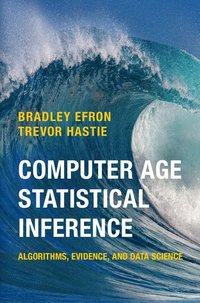
- Format
- Inbunden (Hardback)
- Språk
- Engelska
- Antal sidor
- 495
- Utgivningsdatum
- 2016-07-21
- Förlag
- Cambridge University Press
- Medarbetare
- Hastie, Trevor
- Illustratör/Fotograf
- 5 b, w illus 40 colour illus 50 tables
- Illustrationer
- 5 b/w illus. 40 colour illus. 50 tables
- Volymtitel
- Series Number 5 Computer Age Statistical Inference: Algorithms, Evidence, and Data Science
- Dimensioner
- 279 x 165 x 51 mm
- Vikt
- Antal komponenter
- 1
- Komponenter
- ,
- ISBN
- 9781107149892
- 931 g
Computer Age Statistical Inference
Algorithms, Evidence, and Data Science
- Skickas från oss inom 7-10 vardagar.
- Fri frakt över 249 kr för privatkunder i Sverige.
Passar bra ihop
De som köpt den här boken har ofta också köpt Who's Afraid of Gender? av Judith Butler (inbunden).
Köp båda 2 för 952 krKundrecensioner
Fler böcker av Bradley Efron
-
An Introduction to the Bootstrap
Bradley Efron, R J Tibshirani
-
The Jackknife, the Bootstrap, and Other Resampling Plans
Bradley Efron
-
Large-Scale Inference
Bradley Efron
-
Exponential Families in Theory and Practice
Bradley Efron
Recensioner i media
'How and why is computational statistics taking over the world? In this serious work of synthesis that is also fun to read, Efron and Hastie, two pioneers in the integration of parametric and nonparametric statistical ideas, give their take on the unreasonable effectiveness of statistics and machine learning in the context of a series of clear, historically informed examples.' Andrew Gelman, Columbia University, New York
'This unusual book describes the nature of statistics by displaying multiple examples of the way the field has evolved over the past sixty years, as it has adapted to the rapid increase in available computing power. The authors' perspective is summarized nicely when they say, 'very roughly speaking, algorithms are what statisticians do, while inference says why they do them'. The book explains this 'why'; that is, it explains the purpose and progress of statistical research through a close look at many major methods, methods the authors themselves have advanced and studied at great length. Both enjoyable and enlightening, Computer Age Statistical Inference is written especially for those who want to hear the big ideas, and see them instantiated through the essential mathematics that defines statistical analysis. It makes a great supplement to the traditional curricula for beginning graduate students.' Rob Kass, Carnegie Mellon University, Pennsylvania
'This is a terrific book. It gives a clear, accessible, and entertaining account of the interplay between theory and methodological development that has driven statistics in the computer age. The authors succeed brilliantly in locating contemporary algorithmic methodologies for analysis of 'big data' within the framework of established statistical theory.' Alastair Young, Imperial College London
'This is a guided tour of modern statistics that emphasizes the conceptual and computational advances of the last century. Authored by two masters of the field, it offers just the right mix of mathematical analysis and insightful commentary.' Hal Varian, Google
'Efron and Hastie guide us through the maze of breakthrough statistical methodologies following the computing evolution: why they were developed, their properties, and how they are used. Highlighting their origins, the book helps us understand each method's roles in inference and/or prediction. The inference-prediction distinction maintained throughout the book is a welcome and important novelty in the landscape of statistics books.' Galit Shmueli, National Tsing Hua University
'A masterful guide to how the inferential bases of classical statistics can provide a principled disciplinary frame for the data science of the twenty-first century.' Stephen Stigler, University of Chicago, and author of Seven Pillars of Statistical Wisdom
'Computer Age Statistical Inference offers a refreshing view of modern statistics. Algorithmics are put on equal footing with intuition, properties, and the abstract ...
Övrig information
Bradley Efron is Max H. Stein Professor, Professor of Statistics, and Professor of Biomedical Data Science at Stanford University, California. He has held visiting faculty appointments at Harvard University, Massachusetts, the University of California, Berkeley, and Imperial College of Science, Technology and Medicine, London. Efron has worked extensively on theories of statistical inference, and is the inventor of the bootstrap sampling technique. He received the National Medal of Science in 2005 and the Guy Medal in Gold of the Royal Statistical Society in 2014. Trevor Hastie is John A. Overdeck Professor, Professor of Statistics, and Professor of Biomedical Data Science at Stanford University, California. He is coauthor of Elements of Statistical Learning, a key text in the field of modern data analysis. He is also known for his work on generalized additive models and principal curves, and for his contributions to the R computing environment. Hastie was awarded the Emmanuel and Carol Parzen prize for Statistical Innovation in 2014.
Innehållsförteckning
Part I. Classic Statistical Inference: 1. Algorithms and inference; 2. Frequentist inference; 3. Bayesian inference; 4. Fisherian inference and maximum likelihood estimation; 5. Parametric models and exponential families; Part II. Early Computer-Age Methods: 6. Empirical Bayes; 7. James-Stein estimation and ridge regression; 8. Generalized linear models and regression trees; 9. Survival analysis and the EM algorithm; 10. The jackknife and the bootstrap; 11. Bootstrap confidence intervals; 12. Cross-validation and Cp estimates of prediction error; 13. Objective Bayes inference and Markov chain Monte Carlo; 14. Statistical inference and methodology in the postwar era; Part III. Twenty-First Century Topics: 15. Large-scale hypothesis testing and false discovery rates; 16. Sparse modeling and the lasso; 17. Random forests and boosting; 18. Neural networks and deep learning; 19. Support-vector machines and kernel methods; 20. Inference after model selection; 21. Empirical Bayes estimation strategies; Epilogue; References; Index.


